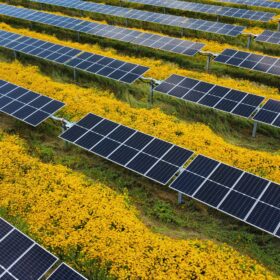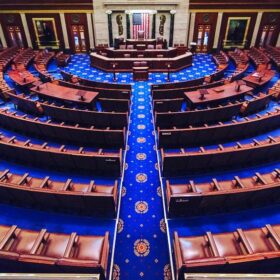The FISU World University Games is an international multi-sport event, organized for university athletes by the International University Sports Federation (FISU). The Lake Placid 2023 FISU Games’ Organizing Committee launched a sustainability initiative called “Save Winter” pledging to reduce the environmental impact of the event by using renewable energy, a more sustainable supply chain and a rigorous recycling program.
The organization has also taken measures to reduce energy use wherever possible, with a redesigned refrigeration system for the ice Herb Brooks Arena—where the 1980 Olympic hockey gold medal was won. The organizers are also using hybrid or electric vehicles wherever possible, and have planted trees to address the carbon emissions that result from the extensive travel required for the games.
The 2023 games are taking place from Jan. 12 to 22 in Lake Placid, New York with 1,443 student-athletes from more than 540 universities and 46 nations competing in 12 winter sports.
The games take place at disparate sites throughout the area and providing power where it’s needed is often a challenge. As a solution, Lion Energy, an official provider of power for the 2023 Games, donated 70 Lion Safari ME solar generators and 100 Lion Safari ME-XP expansion packs, along with solar panels, to power the waxing stations used by alpine ski athletes to prepare their equipment on race days, the announcer and press stations at the Curling Center and a charging station at the FISU World Conference where guests can charge their phones. The generators and expansion packs are contributing to maintaining a local electric power grid that is 100% renewable.
“As the Games Organizing Committee, we acknowledge that there is no way currently to host a perfectly carbon- and waste-neutral event,” said Karlan Jessen, head of sustainability and legacy at the 2023 FISU World University Games. “We feel that by bringing the conversation into the open and by doing what we can, we are setting a benchmark for future Games and for FISU, the international governing body for university sports. We appreciate our providers like Lion Energy who actively support this mission.”
Lion Energy, headquartered in American Fork, Utah, specializes in portable generators for off-grid use. The Lion Safari ME offers multiple plug-in options including AC, USB-A, USB-C and 12 V port, and it can charge virtually anything that can plug into a standard wall outlet (15A) including power tools, refrigerators, medical devices, and even waxing equipment– at a professional grade 2000W/922Wh. An optional expansion battery pack, Safari ME-XP, enables storage of up to three times more energy at nearly 3,000Wh total. Using the sun, it can recharge in as little as 95 minutes with a charge that can be retained for up to one year.
The units include a lithium iron phosphate battery made by American Battery Factory. The batteries can be charged in about 1 ½ hours with an AC cord or with solar energy from 100 W 24 V solar panels.
“As our vision at Lion Energy is to provide eco-friendly power solutions that help individuals, families and organizations of any size become energy independent, we welcomed the opportunity to participate at the 2023 FISU World University Games, which have a strong focus on sustainability,” said Tyler Hortin, president of Lion Energy.
Occurring concurrently, the FISU World Conference ran from Jan. 13 to 15, 2023 to coincide with the opening week of the games and featured athletes, advocates, authors, innovators, environmental leaders in both the private sector and government and researchers. Each of these groups focus on the intersection of climate change and winter sports. Lion Energy’s Tyler Hortin participated in the panel discussion titled “Clean Energy Solutions for Winter Sports and Our Communities” alongside panelists Professor Ken Vesser of Clarkson University, COO Serge Abergel of Hydro-Québec Energy Services, Vice President David Sandbank of NYSERDA and moderated by Professor Susan Powers of Clarkson University.
Last year Lion Energy donated approximately $400,000 worth of generators, lighting and other equipment to support communications and other key electrical services for Ukrainians.
This content is protected by copyright and may not be reused. If you want to cooperate with us and would like to reuse some of our content, please contact: editors@pv-magazine.com.









By submitting this form you agree to pv magazine using your data for the purposes of publishing your comment.
Your personal data will only be disclosed or otherwise transmitted to third parties for the purposes of spam filtering or if this is necessary for technical maintenance of the website. Any other transfer to third parties will not take place unless this is justified on the basis of applicable data protection regulations or if pv magazine is legally obliged to do so.
You may revoke this consent at any time with effect for the future, in which case your personal data will be deleted immediately. Otherwise, your data will be deleted if pv magazine has processed your request or the purpose of data storage is fulfilled.
Further information on data privacy can be found in our Data Protection Policy.